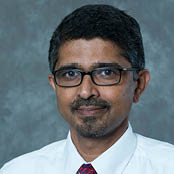
Moore School marketing department chair Satish Jayachandran is quick to tell everyone he meets that the Moore School undergraduate program is the foundation of the university, while the Moore School graduate programs are some of the best-kept secrets, not only at the school and the state but across the country.
Appointed in fall 2021 the associate dean of graduate programs, Jayachandran in this new role will oversee a variety of thought-leading graduate programs, including the:
- 1-ranked International MBA program in the country
- Top one-year MBA program in the Carolinas
- Professional MBA program, currently ranked No. 25 in the country
- Master of Human Resources, which has the No. 3-ranked HR faculty in the country
- Master of Economics, which is among the top schools with its 3:1 faculty-to-student ratio
- Master of Accountancy with a CPA-exam pass rate more than 1.5 times the national average
- Master in International Business, which features a unique Double-Degree program in partnership with other prominent universities around the world
“I love the graduate programs, especially in business,” Jayachandran said. “We attract some of the smartest young professionals from around the world, and I want to make sure we provide the best education possible for tomorrow’s future business leaders. It’s my job to develop the strategy for ensuring that these programs do well in what is often an uncertain, competitive market.”
Jayachandran has diligently researched competitive strategy and marketing; he came to UofSC more than 20 years ago as a practicing marketing professional. He said the graduate program market is fascinating to him as an academic.
“The graduate marketplace has its own dynamics, and marketing is at the heart of what we do with these programs,” he said. “For the Moore School to continue leading in graduate programs, it comes down to our ability to respond to the market and the competitive dynamics at various levels. In recent memory, academic graduate programs have not faced the same challenges that they do today.”
Jayachandran notes that some of these challenges are due to the COVID-19 pandemic, but others are not. He said the graduate programs’ market is unique, especially in terms of recruiting and admissions, but so is the overall job market and the Moore School’s ability to support students as they advance their careers.
“Typically, the market is cyclical; if the job market is good, graduate program enrollments drop and vice versa,” he said. “Over the past two years, this dynamic has changed. Now the job market is solid, and enrollments are increasing. In addition, COVID-19 and other dynamics are fundamentally changing delivery mechanisms, online, remote, hybrid — all these things are now all options.”
Regarding which delivery mechanisms will continue moving forward, Jayachandran said that remains to be seen, but he intends on closely monitoring the market.
“No matter what happens, we have to keep a pulse on the market and make changes as quickly as possible, because if we don’t, we may miss out on great students and also limit our ability to help them reach their highest potential,” he added.
As the graduate programs evolve and students become even stronger and smarter, Jayachandran has advice for them that aligns with how he plans to lead the graduate programs.
“As students and alumni move ahead in their careers, they need to learn to control what they can control. Some things are not going to be within their control; that’s a key part in understanding strategy,” he said. “We are in the age of ‘big data’, and we often believe that what can be measured can be managed, and that is true, but the fact is, oftentimes we are measuring a whole lot of things without a clear idea on how we’re going to use the metrics. Mistakes happen when data gets mis-applied, so students need to develop the ability to understand data in a business sense, learn to craft a narrative which is consistent with the data and then act leveraging their knowledge and instincts.”